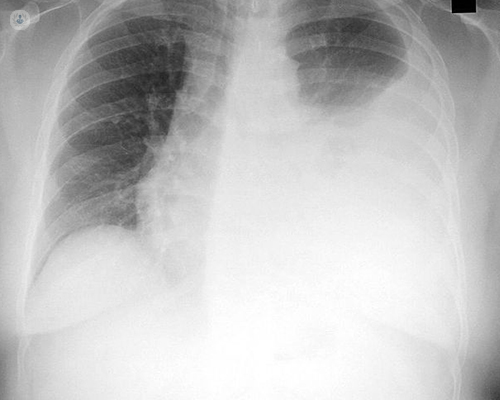


What is pleural effusion?
Around the lungs, there is a thin space filled with fluid known as the pleural cavity. Pleural effusion is a build-up of excess fluid in this space, which limits the space the lungs can expand into while breathing in. The result is impaired breathing, with the patient forced to take shallower breaths.
Pleural effusion is divided into two types:
- Transudative – the excess fluid is similar to normal pleural fluid and rarely needs to be drained unless there is a very high amount. It is usually caused by congestive heart failure.
- Exudative – proteins, blood, inflammatory cells and even bacteria may leak along with fluid from damaged blood cells into the pleural space. It may cause inflammation or other problems, and often needs to be drained. This type can be caused by lung cancer and pneumonia.
What are the symptoms of a pleural effusion?
Although in some cases patients with pleural effusion have no symptoms, a moderately-sized or large pleural effusion may cause:
- Shortness of breath
- Chest pain, usually acute, worse when coughing or breathing deeply
- Cough
- Fever
- Fast breathing
- Difficulty breathing
A doctor will usually order imaging tests such as X-rays, a CT scan, or an ultrasound scan to view the lungs and the pleural cavity in order to make the diagnosis.
Causes of pleural effusion
Pleural effusion can be caused by a wide range of things:
- Leakage from other organs – fluid can leak from other organs and become trapped in the pleural cavity. Conditions such as congestive heart failure (in which the heart doesn’t pump blood around the body properly), liver disease, and kidney disease can all lead to this.
- Cancer – typically lung cancer, but metastases of other cancers can arrive at the lung too.
- Infections, e.g. tuberculosis, pneumonia, etc.
- Pulmonary embolism
- Autoimmune conditions, e.g. lupus, rheumatoid arthritis
- Complication of surgery
What is the treatment for pleural effusion?
The condition that caused the pleural effusion must be diagnosed and treated to prevent any further leakage, for example, the doctor would probably prescribe antibiotics if the cause was pneumonia.
If the pleural effusion is not too big or is not causing any problems, it may not require treatment. However, if it is large and/or causing problematic symptoms, the fluid can be drained, either by a needle (thoracentesis), by a tube inserted into a hole the doctor has made in the patient’s chest wall (tube thoracostomy), or by a long-term catheter if the patient suffers recurrent pleural effusions, so that they can be drained when they occur.
In some cases, surgical intervention may be necessary to deal with inflammation or unhealthy tissue in the pleural cavity.
